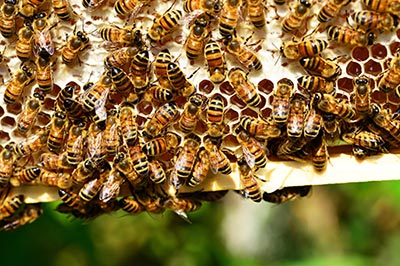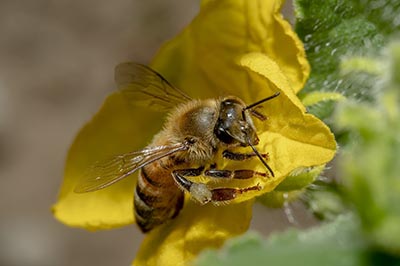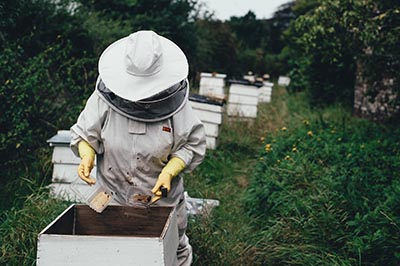Natural Bee Removal
In the world of bees and beekeeping, there’s almost nothing as impressive as a honey bee swarm. A cloud of thousands of honey bees (Apis mellifera) leave an existing hive all at once, and set off in search of a new home. We’ve been getting lots of calls about honey bee swarms over the past month, and they’ll likely continue through mid-summer.
Swarming is a totally normal part of the honey bee life cycle. It’s actually how honey bees reproduce! Each spring, most hives that make it through the winter begin preparations for swarming. They raise lots of new worker bees, begin building “swarm cells” (which are brood cells designed for raising new queens), and the existing queen slims down to get ready to be able to fly again. Once a new queen is ready, the departing workers gorge themselves on honey so they won’t need to eat for a while, and then all of a sudden the old queen leaves, taking about half the workers along with her. There can easily be 10,000+ departing bees in a swarm from a healthy hive!
The swarm of bees typically finds a nearby spot to collect themselves, which is often on a tree branch, in a bush, or on a fence. The swarm typically stays in this temporary location for anywhere from a few hours to a few days. During that time, scout bees are searching for a place for the swarm to make a permanent home. The scouts are looking for a large cavity with a small, defensible entrance. This is often a rotted-out tree or similar natural feature, bees also love to make homes in the walls of our houses, particularly in the gaps between soffit , joists, and rafters. Once the scouts have identified a suitable home, the entire swarm leaves at once to move in. The bees immediately begin building comb, and collecting/storing resources like nectar and pollen. They have successfully established a new hive.
If you see a ball sized of bees hanging out on a tree limb or similar feature, you’ve found a honey bee swarm before it has moved to its permanent home. Don’t panic—swarming bees are non-aggressive since they don’t have a hive to defend. The best thing to do is to call us Beehive Removal Services Wirral 0747 1745 434, and we will be happy to give them a new home!
Reporting swarms is important to help make sure that the bees don’t have an opportunity to move into the walls of someone’s home, where they become a much bigger problem. When honey bees live in house walls, they can live inside a home for years, damaging building materials and attracting rodents/pests with their stored honey. We do lots of honey bee hive removals from buildings in the springtime, and they can be our most time consuming, messy, and challenging jobs Generally, the only option is to open up the wall where the bees are located, remove all bees, comb, and honey, repair the hole from the cut-out, and seal up any locations that bees can enter the building. We do everything we can to successfully relocate cut- out honey bee hives, but they often are not as successful after the stress of the removal. Two things of note: do not seal a hive of bees into your wall, and do not hire a conventional exterminator to poison bees in your wall! Most conventional exterminators will do the responsible thing and tell you to call a bee specialist, but we have been hired for multiple jobs where an exterminator had previously poisoned the bees and didn’t seal up the entrances. Other swarms WILL BE attracted to unsealed locations that bees have occupied in the past, and the residual insecticide will kill or disturb these new swarms.
Again, if you’ve found a swarm, think you might have found a swarm, are seeing bees entering and exiting through a hole in your home, or just have a question, give us a call. We hope you’re staying safe and enjoying the springtime!


